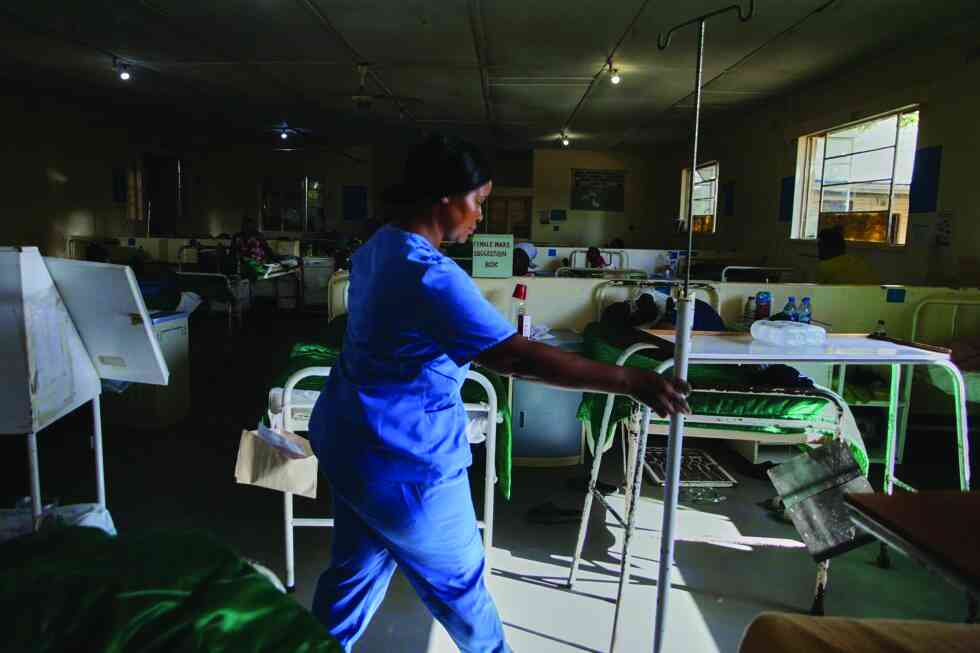
DATING apps in their design were meant to help singles improve chances of meeting potential partners. However, as clearly articulated by Professor Scott Galloway, more and more young people are not having success from such apps.
Alas society has a picture-perfect woman, who is model like and many single women do not physically meet such a superficial standard hence most guys when perusing the apps, go for the smaller proportion of females who fit the template.
Women on the other hand are drawn to this alpha male, an athlete, physically fit and whose bio paints a view of being rich hence a typical normal guy is not attractive just purely based on a dating profile.
The unintended consequence is that 5% of the women are being chased by 95% of the men online while the 95% of those females are chasing the 5% of the males leading to singles' quest for love remaining futile despite many online dating profiles.
Great policies and decisions are not uncommon in our everyday lives.
One thing is, for every great decision or policy, there could be unintended consequences which can even be dire, rendering the original decision or policy bad even though at the time the decision was made, it was a great decision.
America, the greatest economy in the world is currently experiencing surging inflation, 6,41% and was as high as 9,06% in June 2022.
In December 2020 it stood at 1,36%, and this is unimaginable we thought the US had it all figured out.
- Mangudya speaks on banks’ stability
- Mangudya speaks on banks’ stability
- Monetary measures spur exchange rate stability: RBZ
- EcoCash, OK Zimbabwe seal partnership
Keep Reading
Rational economic thinkers expected the federal reserve to raise interest rates as a way to curb inflation. How then did the Fed respond, fastest rate hike in 40 years, these are reports coming out of Wall Street.
The US Fed started to increase rates early in 2022, remember these guys had a zero-rate policy, something they took pride in.
Low interest rates stimulate long term spending on capital goods e.g., housing and durables and these tend to boost the balance sheet of banks e.g., mortgage lending becomes lucrative.
However, unintended to many, household debt balloons meaning default risk starts to lurk on the side-lines. It is the submission of many that the 2008 global financial crisis centred around the housing bubble and was clearly an unintended consequence of the economic boom, which can be traced to long periods of low interest rates.
When the Fed has zero rates, such cheap money allows hedge funds to invest in global markets in particular emerging markets like Africa, and now when the Fed starts to raise interest rates aggressively, investing in risky emerging markets like Africa becomes challenging.
At the time of writing this piece, Silicon Valley Bank (SVB) just went bust.
When interest rates were generally low, these guys are said to have purchased US$80 billion mortgage-backed securities with 10+ maturity profiles coupled with treasury bills and government paper which are literally risk free and here comes the unintended consequence, Fed raises interest rates while these guys are locked in a longer maturity asset leading to massive unrealised losses and eventually a run on the bank.
One asks, was raising interest rates a great decision to curb inflation? An emphatic yes, however, the unintended outcome is we have lost another bank.
Although many risk management and prudential variables could be assigned to the collapse, we cannot run away from the impact the rate increase has had.
On June 27, 2022 the Reserve Bank of Zimbabwe did an unprecedented thing by announcing a 12 000-basis point increase on the policy rate, taking it to 200%.
This was applauded as a much-needed measure to curb the runaway exchange rate and reduce the gap between the official rates and the alternative markets rate.
When inflation is rising faster or higher than interest rates, unscrupulous people and companies borrow at cheap rates and use the money to get hard currency, exerting undue pressure on the exchange rates.
Reading a number of press statements by corporations post 27 June 2022, this measure was applauded as the market witnessed a halt on the alternative exchange rates.
For the first time in months, if not years, there was a scramble for local ZWL dollars as companies rushed to reduce bloated ZWL borrowing positions as 200% could not be easily passed to the consumer.
The devil is always in unintended consequences as the months from July 2022 to November 2022 saw a massive drop in consumer demand.
Liquidity and working capital became a serious problem for businesses. Traditional retailers like Ok Zimbabwe and TM Pick n Pay struggled to push volumes during the same period.
I would not do justice if I do not mention colleagues who had ZWL borrowings and overdrafts whose balances woke up repriced at 200%.
While the nation was celebrating the halt on the exchange, some were crying as they were not effectively hedged against this interest rate risk.
I am sure it was not the intention of Dr John Mangudya to hurt you, an honest borrower who had borrowed to finance school fees for your child.
Let us move on to USD borrowing, the 200% policy rate makes USD borrowing favourable as rates are circa 14% which in itself is a great policy.
However, let me be the devil’s advocate despite me and the devil being sworn enemies.
Have you ever asked yourself whether all these USD borrowings the banks are lending have an equal proportionate USD receipts or deposits to back it up?
The unintended consequence is that 2008 or 2010 or 2015/16 could be back again where you get told that your US dollars are no longer there when you want to withdraw as banks could be printing US dollars through reckless lending, I am not saying they are doing so, get me right, it is a possibility.
When Russia invaded Ukraine on February 24 2022, was it their intention for the global supply chain to be disrupted like we have never seen before?
World Bank reports suggest that in 2019 Russia and Ukraine accounted for 25% of the world’s wheat exports and 14% of corn shipments while Russia was supplying 14% of crude oil and 9% of natural gas globally.
I cannot paint the picture enough for the unintended consequences of this war virtually to everyone.
Whether you support the invasion or not, we are all reeling from the unintended consequences: soaring food prices, severed transport links.
Jokingly you might think as a Zimbabwean what do I have to do with this. I had a conversation with a local finance director and he shared with me that one of their plants had to be put under care and maintenance as the spares were supposed to come from Russia as the equipment was supplied by the Russians and now, they just cannot order and bring the part to Harare.
On the flipside, countries like some suppliers of arms to Ukraine are smiling. Trade is now being done in currencies apart from the United States dollar as a way for Russia to continue trade hence currencies, like the Russian rouble and the Chinese yen etc have been firming.
Coal projects had been dropped as the European Union was moving towards clean energy and Africa was to suffer significantly.
Due to this war, not as per their original intentions, coal investment has resurfaced with several UK companies opening projects in Africa, Zimbabwe we also benefited from these unintended consequences of the war.
The unintended consequence of money supply growth and inflation and runaway exchange rate was you then had Zimbabwe Stock Exchange (ZSE) being one of the best performing exchanges in the world while in a country with one of the highest inflation and a battered economy.
In his book, Dr Gideon Gono titled Zimbabwe’s Casino Economy, it was evident that from his viewpoint, all the extraordinary measures he did during his tenure on the apex bank, he never intended for people to label him as an enemy, a view held by certain circles today.
Gono (2008) stated “it is an insult to Zimbabwe and Zimbabweans to suggest that high ranking professionals in various fields must not be friendly, respectful or loyal to the Head of State or his family. That is just pure nonsense with no precedent in the civilised world” (p.7).
The unintended consequence is if you are seen dining with Nelson Chamisa or any of his close allies you are labelled as CCC, at the time if you hang out with those from Zanu PF or do business with them you are also labelled.
Decision-makers must always be aware of unintended consequences and endeavour to forecast them as much as possible. I end with a Morgan House quote which says “the most important part of every plan is planning on your plan not to go according to plan”.
Unintended consequences are here to stay.
Makwara is a chartered accountant with both local and international experience in finance, accounting, auditing, and business strategy. He is part of the Institute of Chartered Accountants in Zimbabwe and the views expressed in this article are personal views based on his professional experiences.











